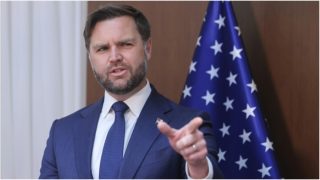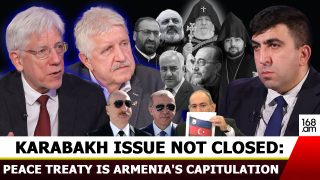Artsakh issue: Price for war and peace
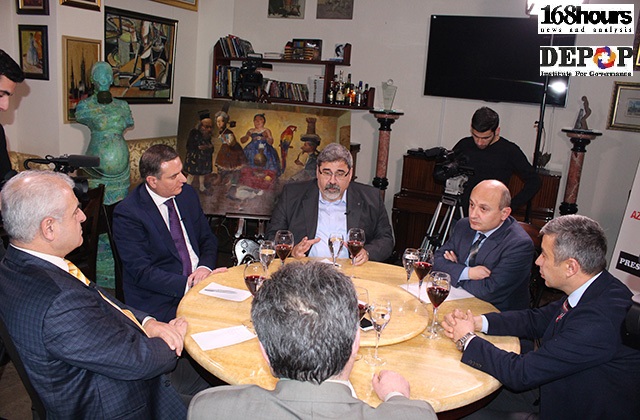
Karabakh issue settlement propaganda and the process itself
Various in-depth issues bothering our country, our society are being touched upon during the debates launched at “Pressing” Club under “168 Hours” newspaper. In this pre-election period our purpose is contributing to conscious election of voters through debates with the participation of political powers, political, economic and social figures, as well as experts. The project is implemented in partnership with “DEPOP” Institute for Governance and “AZAD Pharma AG” ltd. This week’s topic was Nagorno Karabakh issue settlement theme in the programs of political powers, taking part in NA elections.
The debate was conducted by Armen Baghdasaryan, publicist, political commentator.
Participants of the debate are:
Artak Zakaryan—Chair of NA Standing Committee on Foreign Relations, RPA faction MP
Giro Manoyan—Head of ARF Armenian Cause Office
Azat Arshakyan—Representative of Ohanyan-Raffi-Oskanian pre-election alliance
Stepan Safaryan—Candidate for the MP, nominated by proportional list of “Free Democrats” alliance, political scientist
Vladimir Karapetyan—Member of Armenian National Congress (ANC) Board, Head of the Committee on International Relations, ANC
Armen Baghdasaryan: Perhaps, I won’t be mistaken, if I say currently one of Armenia’s crucial issues is Karabakh conflict, if not the most important, however, there is an impression that at this pre-election stage political parties seem not to intend touching much upon this topic. At least positions aren’t either expressed, or are expressed with uncertain formulations. In case, when it’s a crucial issue, and political powers can’t bypass it. Let’s start the debate from the representative of the leading political party: Mr. Zakaryan, is the position of RPA on NK issue settlement already clear in this pre-election period? Which accentuations will be observed?
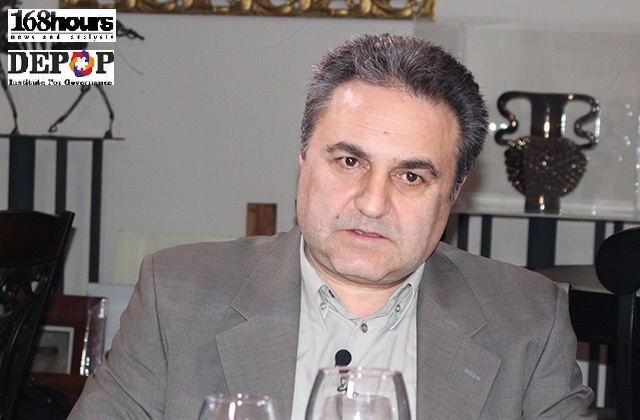
Artak Zakaryan: There has always been clarity for RPA regarding Artsakh issue settlement and other related issues. In the pre-election period, NK conflict peaceful settlement naturally had a crucial role and importance in the program, as well as all related internal and external agenda issues, and surely, supporting NK development processes and preparing the Republic of Artsakh to the future negotiations for upcoming 5 years, stabilization of internal statehood, as well as all issues conditioned both by negotiation formats and the necessity of introducing NK issue in bilateral and multilateral relations from Armenia’s interests are being stressed and distinguished. In this regard, the program will soon be introduced to the society, where, naturally, NK issue peaceful settlement and coming to definitive peace is clearly commented and introduced as continuation and vision of the future.
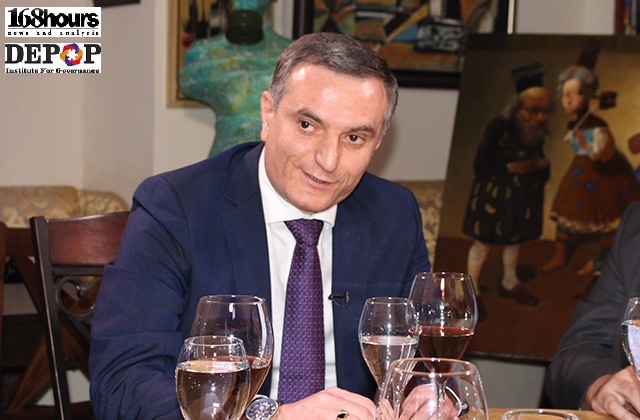
Armen Baghdasaryan: Would you clarify: how does RPA imagine Artsakh issue settlement?
Artak Zakaryan: Within Minsk Group (MG) format, as the only format, necessary and sufficient conditions for recognition by the international community, as well as a perspective for the settlement through realization of the right to self-determination, i.e. different version, than full realization of the right to self-determination, and conditioned by that also creation of sufficient conditions for people’s security and natural development simply lack.
Armen Baghdasrayan: Mr. Manoyan, ARF traditionally appeared with this issue as a more radical power, currently you cooperate with the authorities: do you fully share position of the leading political party regarding Artsakh issue, that it should be resolved based on Madrid Principles, one of the points of which dictates return of 5 territories?
Artak Zakaryan: I’m sorry, but I didn’t mention Madrid Principles, I said—realization of the right to self-determination. Let’s leave Madrid Principles for a while.
Armen Baghdasaryan: But negotiations are developing on its basis.
Artak Zakaryan: Negotiations lack yet, there is a crucial circumstance now, that it’s necessary to provide mechanisms excluding force or threat of force, around which a clear agreement has been reached both in Vienna and in St. Petersburg.
Giro Manoyan: I consider, we are from few political parties with a clear view on Artsakh issue. The fact that reps of only those powers are invited here, prove that not all political parties have clear posture on Artsakh issue. Our cooperation agreement with the RPA has one point, which is not about the form of settlement, but making Artsakh powerful as much as possible. As there are opinions that no matter what the name of the cited document may be—Madrid Principles, fundamental principles, and etc. the document proposed by MG Co-Chairs has two main parts. It was published in 2009 and there was initial agreement in November 2007 as a negotiation document. What does the document read? It has one part, which says: the issue should be settled based on three principles of international law—the issue should be resolved peacefully (we have no issue in this regard), it should be resolved based on the principle of territorial integrity (we have no issue in this regard as well, as Artsakh never comprised a part of Azerbaijan), and third, the status should be clarified based on equality and self-determination of peoples, with which, naturally, we have no issue either.
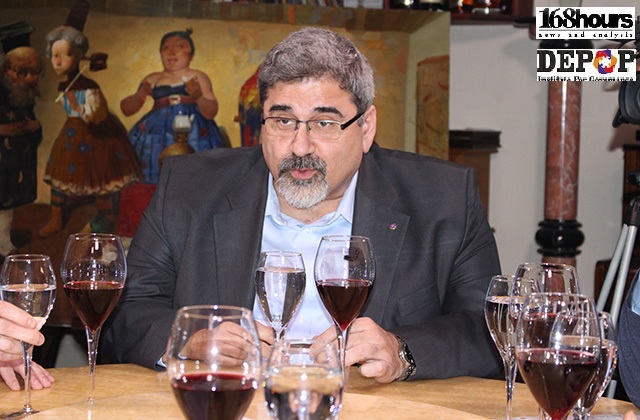
We have an issue with other points, proposed to execute based on those principles. We have an issue, as it ignores the war lasted for 4-5 years after 1988. If it was proposed in 1988, I consider, we’d all agree those proposals, however, on account of the fact, that Azerbaijan unleashed a war, was defeated, a situation has been established, currently all those proposed steps will also mean somehow compensating Azerbaijan. I agree, in fact, it’s been a year that there are no negotiations around the settlement. The reason is Azerbaijan’s posture, and already after April it’s being touched upon that an attempt was made to provide mutual trust by strengthening ceasefire regime though different steps. And in this period we observe that it’s really hard to negotiate with Azerbaijan, even a question mark may be put—is it worth negotiating with Azerbaijan? If there is no agreement before these simple questions and there is no cooperation, which hard issues should be touched upon?
The perspective is that Artsakh should finally join Armenia, works to that end should proceed. Second, from now on we shouldn’t touch upon what we’re ready, as it’s been much covered, and it left the impression on Azerbaijan that it has nothing to give, as we publicly state we are ready to give that territory. That’s why it’s useless saying what we’re ready to concede at least under the conditions of mutual concessions and besides making Artsakh powerful our main mission should also be attempting to provide at least recognition by Armenia’s dimension, i.e. how much Artsakh was recognized by Armenia, if we attempt to provide that much recognition from other countries, it’ll be a big pressure over Azerbaijan.
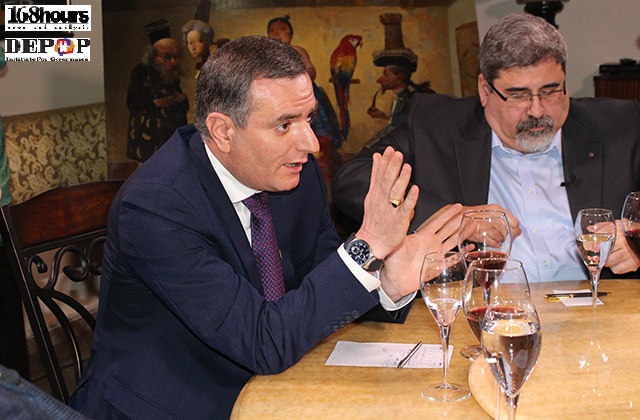
Armen Baghdasaryan: Mr. Manoyan, as I understood you are ready for concessions, however, you consider it shouldn’t be stated loudly.
Giro Manoyan: It’s clear, there should be mutual concessions, but on mutual concessions, that we understand, firstly, I said they shouldn’t be touched upon, then—mutual concessions should be equal and simultaneous, and a part of a general package, and not like: today we’ll give this, tomorrow we’ll see what we’ll have instead.
Armen Baghdasaryan: Mr. Karapetyan, ANC perhaps, is the only power, which as a nail, has clearly chosen Artsakh issue settlement in its slogan and that position seems to be rather clear. Mr. Manoyan also mentioned about mutual concessions. What’s the difference of positions of ANC and ARF in this issue?
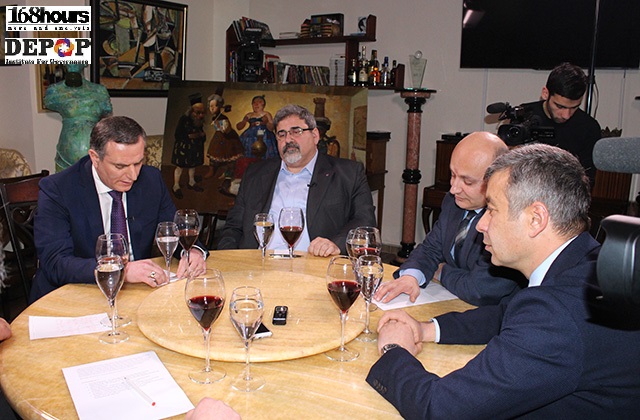
Vladimir Karapetyan: I consider the main difference is that we are ready to more openly speak about how we’re going to prepare the nation for mutual concessions. I call on using only that expression during our speech, as the word ‘concessions’ isn’t proper, and each of us can’t cite that word, as it doesn’t express what’s going on around the negotiation table. Compared with ARF, we can state to which Armenia may go, for which we should prepare our society, population and through which way we may reach to the lasting peace, in particular, as Mr. Zakaryan mentioned that we need to be sure that peace was strong and there was no any threat and there were security and development guarantees. We may record it by coming to an agreement, signing the document…
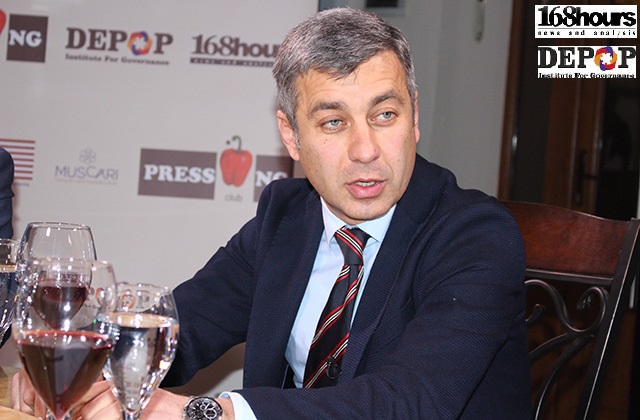
Here I’ll agree with RPA representative, who attempts to bypass the existence of Madrid document on the table: what is stated by their party leader, as well as the Foreign Minister, stating that Madrid Principles lie on its basis. In my personal opinion, considerably conceding the document introduced in 1997,where Artsakh was gifted with the right of veto and it was to decide its future status, equally appearing with Armenia and Azerbaijan.
Currently we don’t have it, however, the Madrid document around which negotiations are currently ongoing, if we pay due attention to respective provisions and record their affirmation, it may provide lasting peace. In this regard I’d anticipate that reps of the leading party or the coalition were more open to the society and more prepared the society that without mutual concessions peace won’t be established in our region.
Armen Baghdasaryan: Mr. Arshakyan, two former FMs are involved in Ohanyan-Raffi-Oskanian (ORO) pre-election coalition. Does the coalition have clear view on how Artsakh conflict settlement will be recorded?
Azat Arshakyan: First figures of our alliance are very symbolic—military, political and diplomats. The Armenian soldier has resolved the Artsakh issue, for the Armenian side it’s resolved as well. As long as there is powerful, combative Armenian army, and the soldier is standing on the border, it’s our territory, the issue is solved. This is a view, and besides Seyran Ohanyan, other freedom fighters are included in the alliance, who participated both in the first and ill-fated last April War. It’s rather tough in our country: as long as we have a good army, it provides both peace and the status. The other part—diplomats, have already stated that it’s our issue, if we are an influential power in NA, an issue will be put forward before our state, that people of Artsakh, who, in fact have realized their right to self-determination, that we all gave a legal shape to the already existent right.
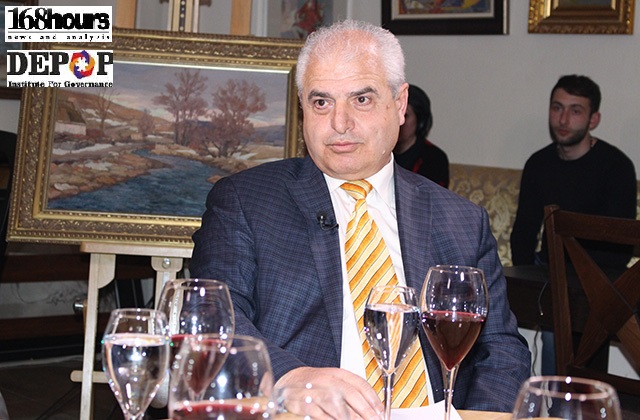
We assess that geopolitical course in our region is favorable, as yet in 1994-95 a crucial provision of Lenin-Ataturk alliance was reviewed and not recognized, that it isn’t the internal issue of the Soviet Union: the Soviet Union doesn’t exist, and it’s an international issue. When existence of MG was declared and recognized, when the world accepted, that the issue should be resolved not based on the principles of Azerbaijan’s territorial integrity or Bolshevik heritage principles, but by control and patronage of the international community, thus, we consider in some sense some provisions of that conference launched 16 March 1921 aren’t recognized. It doesn’t belong to Russia-Turkey or Bolshevik-Kemal judgment, the world should take part in it. I consider, the region is favorable in this sense and we should keep the army strong, make Armenia an effectively managed state, that this state was capable of keeping a powerful, efficient, good army. As long as our good army exists, we won’t face issues.
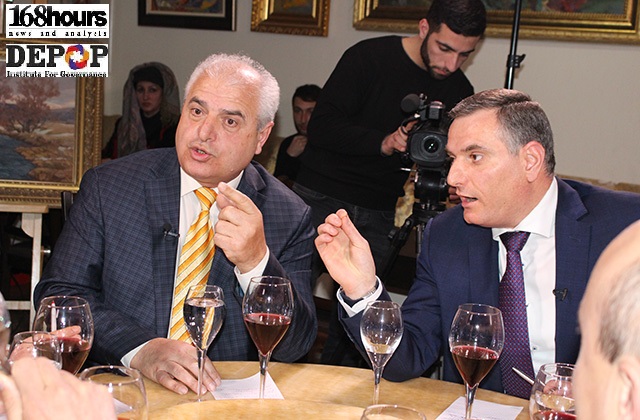
Armen Baghdasaryan: Mr. Arshakyan, to conclude, it turns out that upon position of your alliance we don’t have Artsakh issue, we have solved it, and our issue is making the country powerful from inside to have a powerful army and wait till the world recognizes the right to self-determination and independence.
Azat Arshakyan: Yes. The process of decolonization has reached to the Middle East, i.e. implications of WWI are being reviewed in that region as well. I hope that screw will also lead Turkey to the mausoleum of its Ataturk, and I hope, already there are talks that Lenin’s mausoleum will soon be eliminated and our affairs will be great.
Armen Baghdasaryan: It was a rather clear vision of Artsakh issue settlement, frankly speaking. Mr. Safaryan, did “Free Democrats” party clarify its position how it imagines Artsakh issue resolution?
Styopa Safaryan: I’d start from the point that as a result of cooperation of “Free Democrats” and “Heritage” in 2012 the platform had already been prepared, however, it doesn’t mean that it isn’t being reviewed. Out of rather clear reasons, as in 2012 we had quite a different military-political environment. Of course, requirements or strategic purposes, around which we agreed, haven’t changed. The issue is in other field, as it’s very important what lessons the political powers have learned from the April War, also what lessons they learned at least from the attack experience recorded 2-3 days ago. I don’t consider that lesson will be effective, if we say: we get offended, we don’t think of solutions, as we don’t develop a strategy, in a wider sense—we are waiting, as frankly speaking, starting from RPA theses to my colleagues there was an impression that we only think over managing current military and political risks, but not, of managing the conflict. For the sake of justice, it doesn’t refer to ANC, as you said, despite what attitude we have toward each other’s plans, it’s about rather clear resolution.
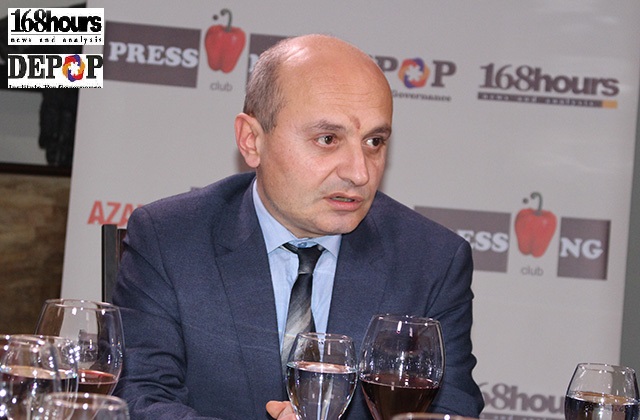
Our solution, of course, is being contradicted to it and other positions, it’s alternative and very different. First, it’s clear that currently we have the issue of managing rather real military-political risks: it’s exclusion of war resumption, and unfortunately, end of policy pursued by the Armenia’s authorities (both incumbent and former), perhaps, was the April War. If we again returned to the threshold of war, this means our policy was need-for-nothing and led to this situation. What’s the solution then? First, was undertaking concrete steps to stop armaments race, which for years, didn’t gain attention. Unfortunately, Armenia rather rudely expressed concern, for instance, linked to provision of armaments to Azerbaijan by our strategic partner Russia.
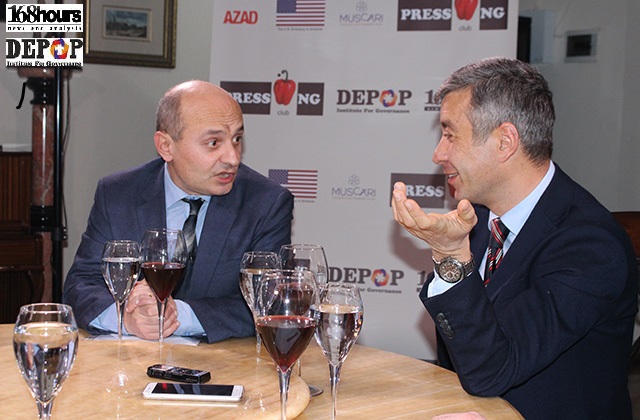
Let me remind, when Serzh Sargsyan visited countries of Latin America in 2014, only that time, yet rather unclearly, he stated that our people are concerned over provision of armaments to Azerbaijan by Russia. Even when the then Defense Minister was posed a question whether as official office he wasn’t concerned over Azerbaijani armaments, the response was literally as follows: we control military and technical cooperation between Azerbaijan and Russia. Armenia reflected to the issue of armaments race too late in case, when we should have thought over preventing it. It should have been included in foreign policy agenda. Finally, MG, which is a peace broker in a wider sense, its two countries rather clearly don’t provide armaments to the conflicting side, in this case—to the sides of Artsakh conflict, and in future nothing prevented us from putting the issue of protection as a norm by Russia.
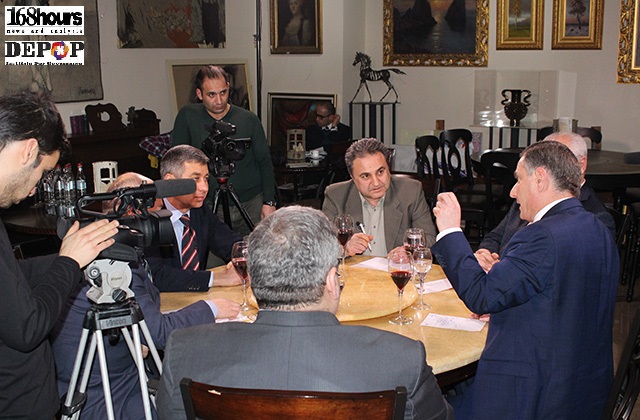
Artak Zakaryan: Would Russia follow it?
Styopa Safaryan: You know, at the moment I don’t want to say what would happen, as neither I can say what Russia would do, nor you can convince me what it would do.
Vladimir Karapetyan: I know that the issue has been raised.

Styopa Safaryan: That issue is being raised every 6 months, which isn’t enough. Our first step is the policy of restraint of Azerbaijan, which doesn’t include the issue of armaments race only, but also of powerful army and raising army’s combat readiness, as well as enshrining mechanisms of restraint in the system of international relations regarding liabilities by bilateral relations. When you ask how, my reply is that in 2012 I called on all the MPs, factions at the NA, that, for instance, having at least an attached condition to the amendment to the CSTO protocol, that Armenia will respect that international liability, if they respect interests of vital importance to Armenia, but there was no any reservation.

If, God willing, “Free Democrats” will be a majority in the NA, then yes, these issues need review, likewise agreements should be mandatorily be accompanied by reservations, as we believe, they are mechanisms of risk management, at least—providing their vitality in life.
There are several principal issues regarding settlement, which the authorities not only failed to solve, maybe again Vladimir Karapetyan will say that RPA has stated a lot on it, it’s the same, the issue of return of Artsakh’s legally elected leadership is involved in the negotiations. This is an issue of paramount importance, which Armenia again nominated by seasonal principle. On the days following the April War the Armenian authorities stated that hereinafter Azerbaijan should talk to Stepanakert, but let me not enumerate how many meetings have followed it on bilateral format.

Perhaps there is one point, which I’ll agree, and frankly speaking it isn’t new: it’s installation of investigative mechanisms, where also official Yerevan, even if being consistent, has failed. Madrid Principles can’t be acceptable also for the reason that at least for “Free Democrats”, as they touch upon not established self-determination of Artsakh issue, but they also speak of expression in the future, at least of mandatory importance, at least, its name will be a referendum, and etc…
Vladimir Karapetyan: Thus, are you against Madrid Principles?
Styopa Safaryan: Yes, we have always expressed against them. Our pre-election list is against Madrid Principles out of several reasons. That document, which in 2007 was adopted by the Armenian authorities and the Foreign Minister, and stated that they adopt it as a ground for negotiations, also planned another thing, which can’t simply be acceptable. It refers to the point that expression, and generally recognition of Artsak’s status was left as hostage to Azerbaijani authorities, i.e. if they agree, it’ll occur. Accordingly, let me again return to 2012: this isn’t new, i.e. if Aliyev disagrees, the document isn’t being signed.
Vladimir Karapetyan: But if agreed, it’s signed, if signed, is that a good one?
Styopa Safaryan: Mr. Karapetyan, I think we have alienated from signing for kilometers.
Vladimir Karapetyan: If signed, Aliyev will agree for expression.
Styopa Safaryan: Theoretically yes, practically—no. Practically Aliyev demands Zangezur and Yerevan as well, let’s not touch upon it. Expression of Artsakh issue shouldn’t depend on Aliyev, as recognition of independent statehood should be directly subject to objective realities. It, of course, supposes political settlement, however, if one state settlement satisfies the criterion submitted to the state, it’s only worth recognition. And, yes, international recognition of Artsakh issue is our next target.
Armen Baghdasaryan: Let me attempt to conclude your program by one sentence: you say, steps should be taken that Russia didn’t sell armaments to Azerbaijan, Artsakh should again be brought to negotiation table, and take steps toward world recognition. It seems to me, that it isn’t a program, but a collection of intentions, in any case, of good intentions.
Artak Zakaryan: As for becoming of “Free Democrats” as a majority, in this case, as a humor, let me say, maybe NK issue settlement will be easier, than observing you as a majority in the NA. As for the RPA slogan, our party has chosen the one, which is both comprehensible and demanded for all the society layers: security, which contains the group of all types of security—from food security to communication and physical one. And progress which we need in all fields. These are issues mutually complementing one another: without security it’s impossible to provide progress and vice versa.
Regarding what RPA did formerly, let’s not discuss it here, for that there are elections, and the society will assess. We did our best that war was turned into clashes, if the policy you protect was pursued, including “Heritage”, we couldn’t have confronted the April War by that policy.
Styopa Safaryan: I guess you called them clashes.
Artak Zakaryan: The April War, which lasted for four days, as Armenia had enough internal and external resources to provide that security. You say armaments race: we are against any kind of senseless or end in itself armaments, and our purpose isn’t that. We need the level of armament as much as demand peace provision issues in our region. Our arming is targeted at peace, and we didn’t consider anyone an enemy until we observe hostile operations, thus, it’s clear who our enemies are, with whom we hold negotiations for peace, and not for war.

Styopa Safaryan: But you remembered in 2014 that there is an issue of armaments.
Artak Zakaryan: We didn’t remember in 2014: the issue of armaments has existed. After the development of August 2014 (on the state border of Armenia) that issue already became public, and prior to that in diplomatic and political negotiations those issues have been repeatedly set forward, it’s another issue, that is hasn’t been announced.
Styopa Safaryan: It failed.
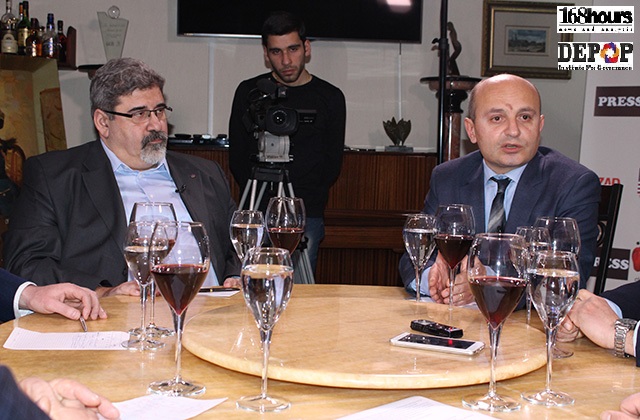
Artak Zakaryan: It didn’t, but Armenia is in a different military-political, military-technical balance and, unfortunately, cooperation with Armenia, doesn’t restrict its ally to cooperate with other states as well. We’d all prefer Azerbaijan not to have a source for armaments, however, both Ukraine and Belarus, as well as many other states have regularly been in military-technical cooperation with Azerbaijan.
In our both 2012 and present program it’s clearly stated that everything should be done that Artsakh returned to the negotiation table as a full side. It should be mandatorily recorded if we speak of the final outcome. Currently Armenia, as a security guarantee to the people of Artsakh, holds negotiations in the format, maintaining interests of Artsakh issue, however, in the process of decision-making, naturally, no decision can be made without official Stepanakert.
Vladimir Karapetyan said we should be more open to the society, and I consider, NK issue always existed in all public speeches, and we clearly stated that the way, by which we should approach NK issue settlement, is realization of the right to self-determination.
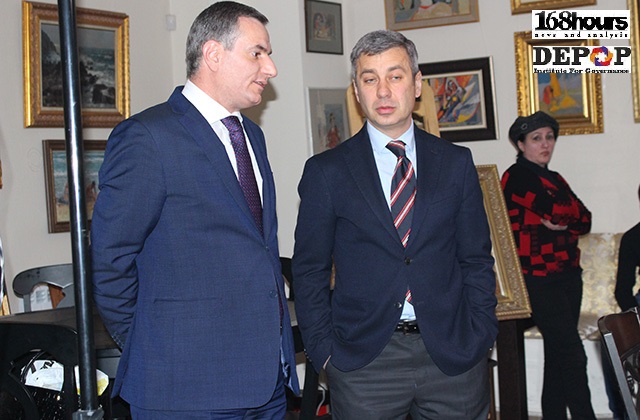
Armen Baghdasaryan: I guess the authorities had that very posture in 1996-97.
Vladimir Karapetyan: It wasn’t their posture, a document was initialed and Armenia expressed in its favor.
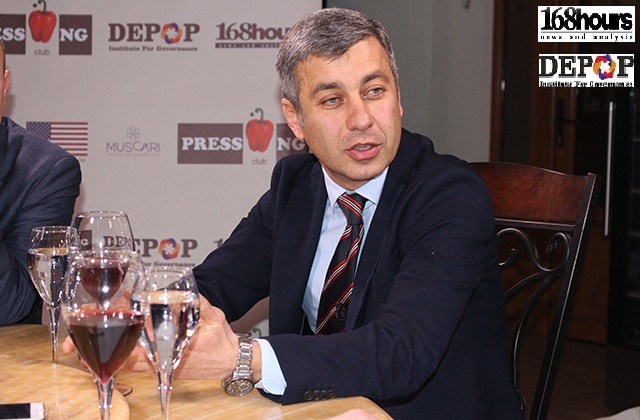
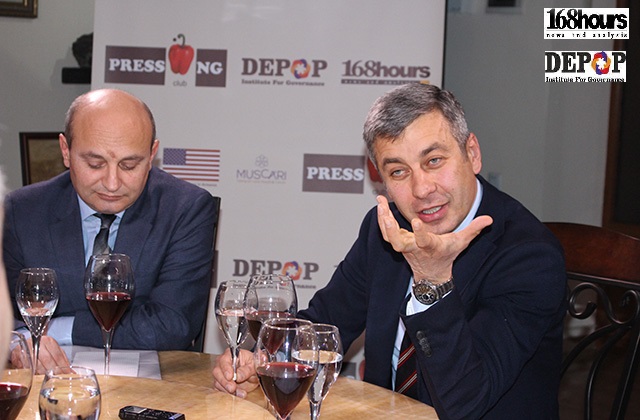
Artak Zakaryan: Kazan document was exactly that type, and Armenia went to that document: it also had Madrid Principles on its basis, and the issue totally started with the properties of the right to self-determination and different intermediate issues. What do we have at the moment? After 2014 it was clear for everyone that trust atmosphere is already damaged, and we may say it totally lacks. In April 2016 we already saw that generally it’s useless speaking of trust atmosphere, accordingly, meetings both in Vienna and St. Petersburg had one purpose—restore all mechanisms and opportunities, which we can, and realize at least one of those three principles.
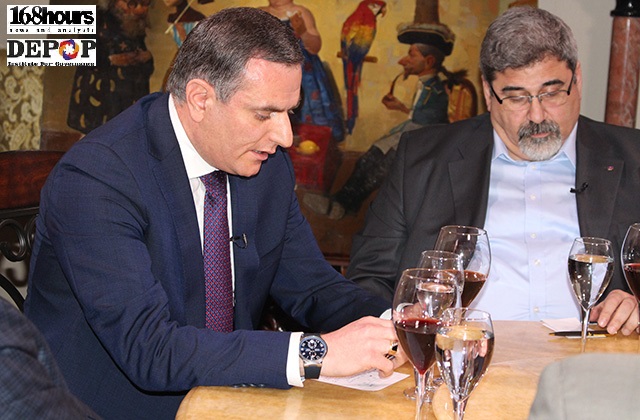
Styopa Safaryan: Excuse me, if it’s being touched upon, why do you speak of concessions?
Artak Zakaryan: Who spoke of concessions?
Styopa Safaryan: Serzh Sargsyan’s numerous speeches last year…

Artak Zakaryan: Serzh Sargsyan provides the full snapshot: he says it should be on the basis of mutual concessions, that it should start and develop through the right to self-determination and with the participation of official Stepanakert. Armenia has nothing to concede. Of course, we’re all interested that the issue had a very speedy resolution, as it’s the key to development of the entire region. However, we shouldn’t exclude the circumstance, that besides conflict settlement, there are powers interested in conflict management. We should take into account external political environment as well, in which we are, also threats, changing interests and here we should be able to pursue the policy with patience, which we currently do. Of course, that policy costs us too dear: we’re losing the most valuable capital in that policy—human lives. It’s the value, which we should evaluate as our security guarantee.
Armen Baghdasaryan: You consider there is no other way out.
Artak Zakaryan: Not there is no other way out, it’s a way urged on us to provide our existence.
Vladimir Karapetyan: You’re expressing dangerous minds: we should be cautious while speaking of human lives. Finally, we should do our best to save each life and not consider it a price we pay.
Artak Zakaryan: I mean the same. Don’t say things, that people thought I mean something different.
Vladimir Karapetyan: I call on giving a bit cautious formulations.
Artak Zakaryan: Everybody knows it, what’s the sense of being one? We speak of it today: you speak, the media outlets speak, everybody speaks of it. Is it something to hide? That’s what makes us different from Azerbaijan, we don’t conceal and simply speak of it, as it’s one of the grounds, conditions of our existence in the Armenian Highland. We should strive to peace by strengthening the castle as well, by showing our defensibility, that’s why we substitute many issues today by security provision, that’s why many fields suffer that we direct more sources to defense, security, strengthening of the army, we currently speak of nation-army notion. Let’s look to the example of Israel. Of course, there are differences, but similarities are observed as well, and one can’t at once destroy the environment of those threats.
We saw how Azerbaijani aggression was welcomed by Turkey. We haven’t assessed those threats yet, we are yet thinking over eastern threat. Accordingly, all political processes should be observed in one general package. Peaceful and pro-Armenian resolution of Artsakh issue is necessary for us to completely eliminate corruption in the country, to solve all security mechanisms through rising governance productivity, were able to provide investment environment, to provide Armenia-Diaspora cooperation with the entire volume of its vitality, by using whole potential. Thus, we have numerous issues and Artsakh issue isn’t segmental, which is put aside. Corruption also prevents our security and stabile development, including: Karabakh issue settlement.
Vladimir Karapetyan: It was pleasant to listen to confession.
Artak Zakaryan: But when didn’t we say that corruption, unfortunately, exist in our country?
Azat Arshakyan: Saying isn’t enough, it should be eliminated.
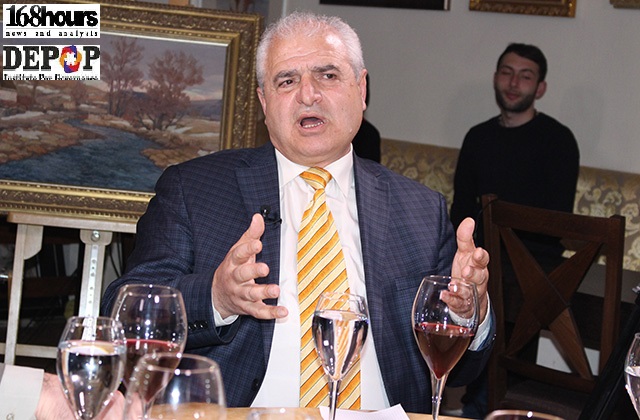
Giro Manoyan: On the one hand, they say it should be openly expressed, we should prepare people, on the other hand, it’s stated that at every occasion Serzh Sargsyan, as the president, touches upon these issues.
Styopa Safaryan: It was mentioned that those issues have been covered in Vienna and St. Petersburg, and I said if those issues were covered, why do you speak of settlement packages? Throughout last year they were talking about it, in the very December speech as well.
Artak Zakaryan: Mr. Safaryan, I say once again—in principal, conceptual speech one can’t but cover them.
Styopa Safaryan: It’s possible. In particular, when every time Azerbaijan thinks after shelling, that it shoots on us, and we miserably speak of mutual concessions.
Artak Zakaryan: Why do you speak of it? What are you going to write in your party program: only Vienna and St. Petersburg?
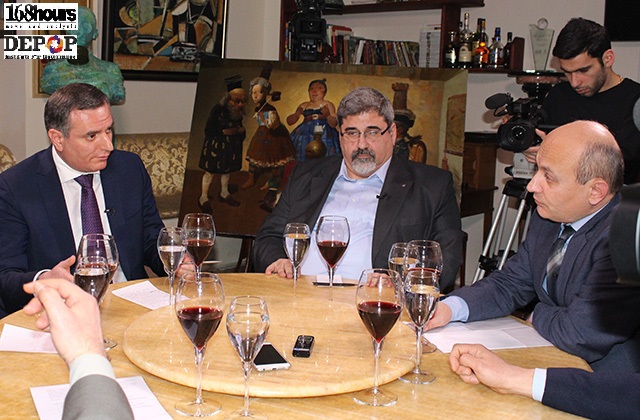
Styopa Safaryan: No, we needn’t mentioning them.
Vladimir Karapetyan: He [means Styopa Safaryan – ed.] said they don’t accept Madrid document. He literally said, what else can be touched upon?
Styopa Safaryan: Yes, of course, we don’t. Why should we accept it?
Vladimir Karapetyan: Thus, our young men should defend the border by price of their lives for the purpose that the party says no, no document should be signed, right?
Styopa Safaryan: Mr. Karapetyan, I didn’t mean that at all.
Vladimir Karapetyan: If you’re against the document, which is on the negotiation table today…You don’t say if it improves, our interests are protected, but you say we’re against that document.
Styopa Safaryan: If “Free Democrats” come to power, contrary to RPA anticipations, and conduct negotiations, I mentioned the targets we’re going to implement to reach it. And one of them is eliminating the issue of legality of the referendum, held in Artsakh, from the field of Azerbaijani president Ilyam Aliyev’s caprices, which, unfortunately, was put in dependency. You know that upon Madrid Principles it should occur by Azerbaijan’s consent.
Vladimir Karapetyan: Nothing is being signed without the consent of the sides.
Styopa Safaryan: Anyone conforming to the criteria of Armenian citizen, it isn’t mandatory that Ilham Aliyev gave his consent.
Giro Manoyan: When it was mentioned that conditions of the document of 1997 were better, we don’t share that view.
Vladimir Karapetyan: Why? For the purpose that Karabakh was against, Karabakh was to decide its future, had equal conditions? Pursuant point 8 of the document, Artsakh should decide its future by equal conditions with Azerbaijan. And not the document, to which you agree now and make a coalition.
Giro Manoyan: We don’t agree with that document.
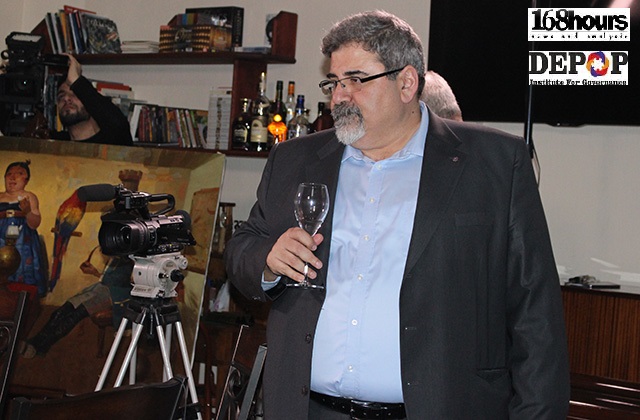
Vladimir Karapetyan: How come? Why don’t you leave the coalition then?
Giro Manoyan: Why should we? ANC seems rather disturbed, that we are in coalition. We cooperate in other issues. The approach of Ohanyan-Raffi-Oskanian alliance is also interesting, as Oskanian negotiated himself. I haven’t heard from him, but people say he has changed his opinion now, that Madrid document is isn’t good anymore, as conditions have changed. Regarding what upcoming steps currently exist: besides strengthening of Artsakh and Armenia, also the recognition process is existent. In the process of recognition signing of Armenia-Artsakh Republic military-political cooperation agreement, which in the period of April War the Minister instructed, it’s ready, however, out of unknown reasons we’re waiting for a proper moment. In fact, it has really passed. If we find a few states, which recognize the Republic of Artsakh as much as Armenia, there will be a great pressure over Azerbaijan. We should more touch upon this, rather than mutual concessions, or spreading moods among the society. Our people have no difficulties in reconciling, if the other side is fair.

And we observe that there is nothing from the Azerbaijani side, and the simplest things—even exerting the agreement following the April War fails, how can we touch upon more fundamental things? Particularly according to ANC as if Aliyev is waiting impatiently that the Armenian said when the agreement should be signed, that’s why the agreement hasn’t been signed yet. On the very day our president states that recognition of the Republic of Artsakh means war, we say that it’s a wrong statement, as it isn’t so. You can’t, if you do it, tomorrow you’ll go and ask the third side to recognize it. Let them recognize as much as Armenia, let in all the capitals there was a representation of Artsakh Republic with diplomatic numbers, and look what Azerbaijan will do that time. That is to say, we shouldn’t wait that these negotiations remained hostage in Azerbaijan.
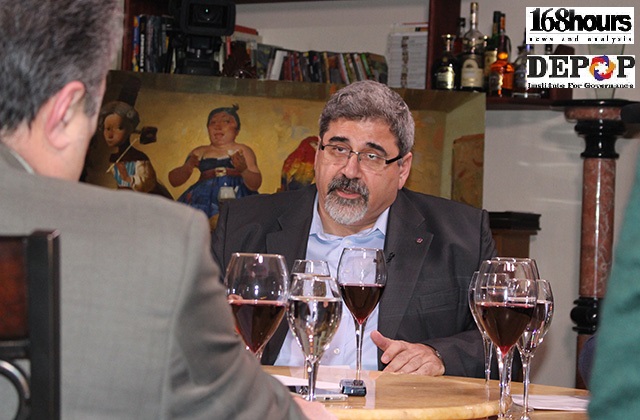
Vladimir Karapetyan: I very concerned over the atmosphere, developed around this table. I feel, that this situation, moods are spread by these political powers among the society as well. We heard rather simply that 3 political powers present at today’s debate don’t realize achievement of agreements reached around this negotiated document, they imagine, that we should have such a course we had after 1998, let me remind that in 2009 Armenia’s budget was much more, than it’s today, i.e. in the period of 8-9 years we weren’t able to record economic development. ARF, RPA bear direct responsibility for that.
Giro Manoyan: In 2009-2016 we weren’t among the authorities.

Vladimir Karapetyan: Currently you are, and currently the Republican PM doesn’t work well, economy faces hard times. In 2009 Armenia’s budget comprised more than 3 billion, currently it doesn’t reach that threshold. As for the situation on the line of contact: in 1994, when the agreement on cease-fire was reached, after that we had 2000 victims as if under peace, and political powers don’t touch upon peace today, but only publicly state populist words on Armenia’s strengthening, they didn’t take a single step to reach that, and simply create a situation that this tension proceeded, and we addressed these tiny resources for keeping the border.
Armen Baghdasaryan: Mr. Karapetyan, I consider, everyone speaks of peace and everyone wants it. The issue is a bit different. In 1938, when Hitler brought his troops on Czech border and demanded that they withdrew western borders to Germany without war, as ethnic Germans were living there, the Czech government decided to give territories to Germany. Churchill’s well-known expression is linked to that, that “Chamberlain had the choice between war and shame. Now he has chosen shame—he’ll get war later.” Thus, such an issue exists. Everyone wants peace, but what’s the price?
Vladimir Karapetyan: I think your comparison isn’t a proper one.
Giro Manoyan: You don’t see the one before you.
Vladimir Karapetyan: Firstly, we see very well. We understand the issue rather well, we should separate propaganda from the very process, which is ongoing. The very process is negotiations around the Madrid document. Now RPA representative Artak Zakaryan says there are no negotiations. I disagree, Mr. Zakaryan, you aren’t right. You again want to develop a campaign atmosphere. If we sit and state here that they only touch upon the principles of St. Petersburg and there are no negotiations on settlement of the negotiations and the issue, should we be correct?
We all know that this situation can’t last long. We can’t simply turn a blind eye on what’s going on the border and which pressures are exerted over Armenia and Nagorno Karabakh. Currently negotiations are really ongoing, there is a document on the table, and Aliyev, whether he wants or no, negotiates around that very document. Why it shouldn’t be stated that there are negotiations, that what’s taking place on the negotiation table. Our supergoal should be self-determination of people of Karabakh, that they lived under secure conditions and exercised their power in the area. We won’t concede anything from NK territorial integrity.
Styopa Safaryan: What do we understand by saying territorial integrity?
Armen Baghdasaryan: It seems different things are understood under it.
Vladimir Karapetyan: Clarify, let everyone express.
Artak Zakaryan: What do you mean, when you say we won’t withdraw anything?
Vladimir Karapetyan: Currently the situation established in east Ukraine, in particular, separation of Donbass and some territories of Lugansk, and as ethnic Russians comprise a majority there, do you consider their aspirations of joining Russia realistic? I can say under current state of affairs it’s impossible.
Artak Zakaryan: A concrete question was posed—what does it mean: we won’t concede anything?
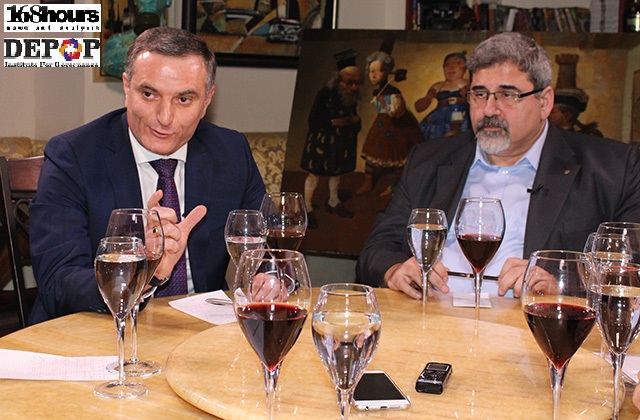
Vladimir Karapetyan: Territorial integrity of Nagorno Karabakh should be kept, the principle of NK’s self-determination should be respected. I’m not the representative of Artsakh. People of Artsakh should decide themselves the document, in which concessions are touched upon. We consider those concessions may be reasonable if they provide self-determination.
Azat Arshakyan: Artsakh has outlined its territory, borders. Do you mean that territory?
Vladimir Karapetyan: In an interview with Kiselyov a few weeks ago Serzh Sargsyan touched upon some elements of the package of mutual concessions, where there was an attitude to your question, i.e. those territories were meant. No official in Artsakh reflected to that. I consider there is deep perception of the process taking place in negotiations.
Azat Arshakyan: Do you mean the territory declared by Artsakh?
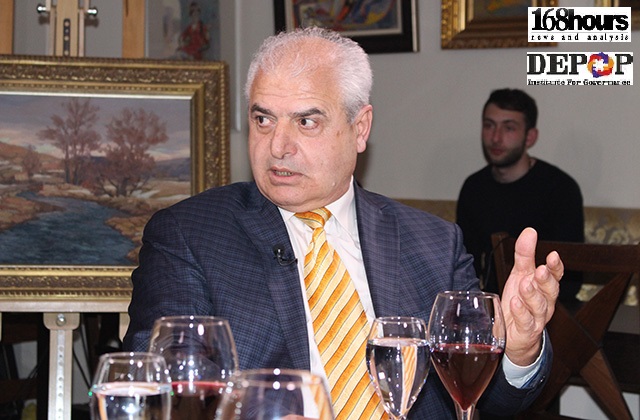
Vladimir Karapetyan: I answered to your question: when Serzh Sargsyan touches upon the plan of mutual concession, no NK official reflected to that, accordingly, I consider, more adequate people are giving more adequate assessments there, what’s taking place in negotiations.
Artak Zakaryan: Of course, everyone may comment on interviews and statements of Armenian president the way they imagine, however, the reality is as follows. All the statements by our president around NK should be observed in this context, and the concept of mutual concessions was never an end in itself and won’t be despite who Armenia’s leadership will be. The purpose is peaceful reaching to the right to self-determination of NKR. Our purpose isn’t that we solved the issue and that’s it…
Vladimir Karapetyan: You again launch a campaign, don’t do that.
Artak Zakaryan: You say you gave 2000 victims in the entire post-war period. We liberated NKR adjacent territories with the price of more victims, why did we do that?
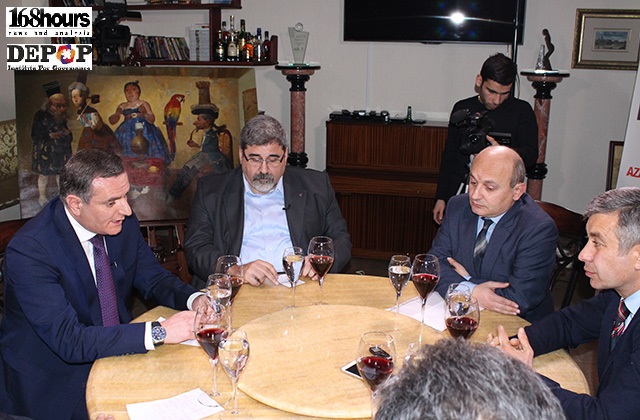
Styopa Safaryan: There are no NKR adjacent territories.
Artak Zakaryan: It was called so then. Currently they are within NKR official border and pursuant Constitution, as long as NKR issue isn’t solved, they are under control of the Republic of Artsakh. You say those other victims we gave, let’s put their issue aside, and think over those we’re going to give.
Any victim despite the fact that they were given during war, is the most valuable, that’s why we’ll do our best that this peaceful settlement process, which has been launched, wasn’t limited by the right to self-determination only. The period of post-conflict or post-settlement also exists. Conflict isn’t only the period we imagine. Our fight won’t end by that, in future diplomatic and political fight with Azerbaijan will heat. Suppose, even Azerbaijan officially recognized Stepanakert. MG already realizes, if that process doesn’t move forward, it’s senseless touching upon any discussions, the sides aren’t ready for that. We understand that we should do our best that Karabakh’s international recognition was launched and we perfectly realize that it should start from us, however, of course, it shouldn’t be only Armenia’s recognition, it should go by international package and we should be sure that after our recognition at least a few states will recognize it. As for the agreement on military-political cooperation, naturally, Artsakh will be a side as a subject, state, with which an interstate agreement is being signed, mechanically it’s called recognition, of course, I mean half-step agreement.
Styopa Safaryan: I said also in 2007 that Madrid proposals are a way leading to war, to the extent Armenia officially took that document as a ground, accepting that there are territories, which should be returned, Aliyev stated in all negotiations, “You were saying that they should be returned, weren’t you? Accordingly, first, de-occupation, withdraw the troops.”

Vladimir Karapetyan: Has any document been put on the table after 1994?
Styopa Safaryan: Unfortunately, not.
Vladimir Karapetyan: Have you ever spoken of it? Or you now mention it as you cooperate with “Free Democrats”?
Styopa Safaryan: Mr. Karapetyan, it seems to me you didn’t well follow my publications. We were stating for years that under international guarantees exclusively lies the issue settlement and Artsakh’s recognition, there is nothing beyond it. When you ask why we refuse Madrid document, the topic of peacekeepers was introduced.
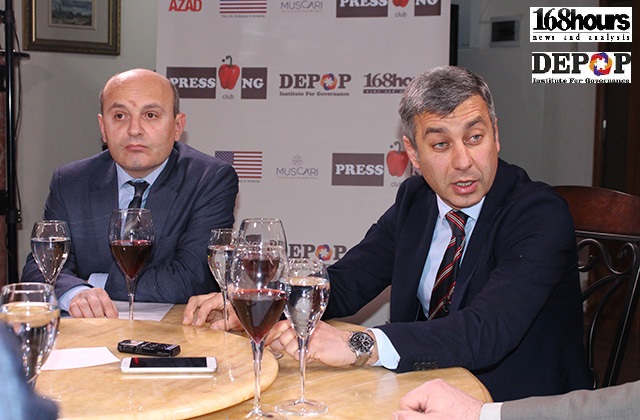
Vladimir Karapetyan: It wasn’t, it’s in the document.
Styopa Safaryan: I mean exactly that.
Vladimir Karapetyan: What will happen without peacekeepers?
Styopa Safaryan: You perfectly made reference to the developments in Ukraine, Syria, which best show, that even international norms don’t function, accordingly, having hopes that partial solutions may be reached, that by deployment of peacekeepers security of the people of Nagorno Karabakh will be ensured, it didn’t happen and doesn’t happen now, and its proof isn’t our program, but the developments occurring before us in Syria, in Ukraine. I’ve already touched upon territories subject to return, that tragedy, which led to war, as Aliyev justified the four-day war of 2016 by this very way.
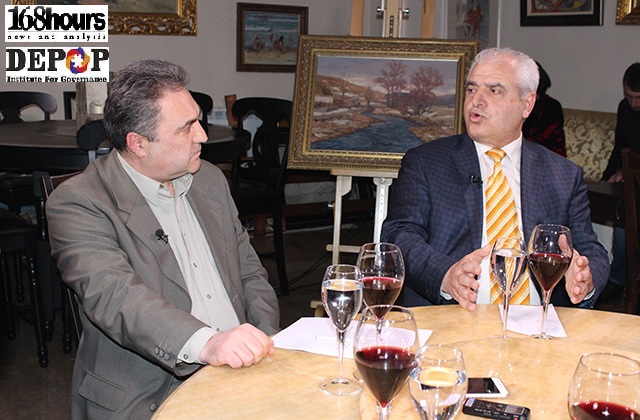
Let me return to territorial concessions. The thesis, that we say Artsakh should return to the negotiation table, we don’t mention it to complicate the settlement process, but for the reason, that we are sure, and this is the only truth, that the population of that territory decided development of its local and central authorities, also it should decide its status. I’ve already hinted that any statement on concession or mutual concession from Armenia is commented as a big influence of its shootings, i.e. if I shoot this much and they’re so much afraid, means if I shoot more, they’ll be more afraid and will return more. Accordingly, in this regard until normal conditions are not established for negotiations, others linked to that shouldn’t exist. Despite RPA states there are no negotiations, perhaps, I’ll agree in one point with Mr.Karapetyan: so, what do you discuss so long?
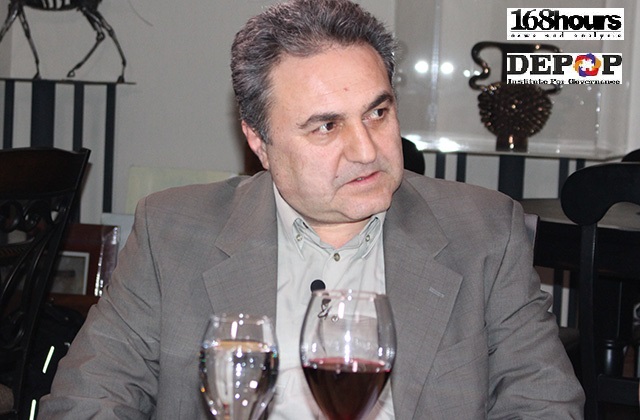
Artak Zakaryan: How much do we talk?
Styopa Safaryan: Much. You conduct endless talks. I mean those referring to settlement elements, here principal policy is meant. If you say I won’t discuss anything until Azerbaijan behaves well, in this case we shouldn’t discuss it, even with Lavrov’s mediation.
Artak Zakaryan: Mr. Safaryan, negotiation format shouldn’t suffer.
Styopa Safaryan: No one says: let’s damage negotiation format, nobody speaks of it. I don’t want to leave the impression that I demand radical changes.
Vladimir Karapetyan: I have that impression.
Styopa Safaryan: If it’s radical for you, I’m glad, but in this case, didn’t the topic of peacekeepers appear in the agenda throughout recent years?
Vladimir Karapetyan: Where?
Styopa Safaryan: Read Serzh Sargsyan’s interview with Deutsche Welle.
Artak Zakaryan: But Serzh Sargsyan said he’s against peacekeepers.
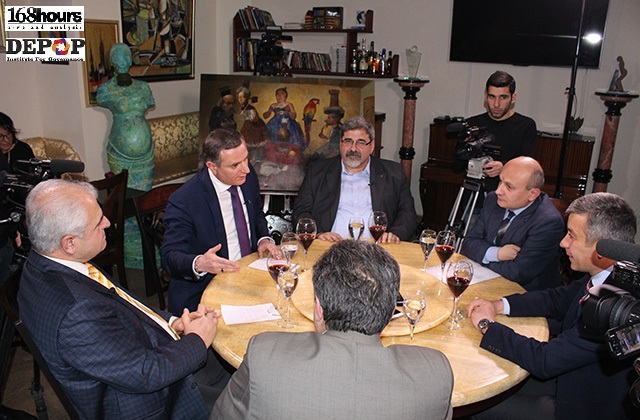
Styopa Safaryan: No, I say the topic was raised.
Vladimir Karapetyan: You artificially introduce that topic. Exactly you.
Styopa Safaryan: I? Armenia’s president officially…
Vladimir Karapetyan: He was given a question and he replied to it. I didn’t understand, what should have he said?
Styopa Safaryan: He could say such topic doesn’t exist.
Vladimir Karapetyan: What Russian peacekeepers are meant? Why do you stress it? Just the contrary, it lacks now.
Styopa Safaryan: It seems to me you are aware, that last year Germany was presiding and reporter of German Deutsche Welle after the April War won’t give accidental questions or those provided by Styopa Safaryan.
Vladimir Karapetyan: We repeatedly saw that reporters pose accidental questions.
Styopa Safaryan: Mr. Karapetyan I’m completely against the thesis by ANC leader Levon Ter-Petrosyan, that Karabakh is a burden.
Vladimir Karapetyan: What connection do the victims and the burden have?
Styopa Safaryan: You constantly hint that we have victims, as the issue hasn’t been settled.
Vladimir Karapetyan: Isn’t it clear that this is the reason? We had 100 victims.
Styopa Safaryan: Bad equipment of the army, capabilities of incorrect waging of war…
Vladimir Karapetyan: Mr. Safaryan has become an expert of everything, he is now a military expert.
Styopa Safaryan: This is a fact, there is not an issue of a military expert.
Azat Arshakyan: I had the impression, that the Foreign Ministry is a union of collaborationists, those people have done nothing good, they all want that we gave up. Now I want to say that their work shouldn’t be forgotten. Serious success has been recorded. Madrid, Kazan, St. Petersburg all formulas have been the achievements at the initial stage, as at that stage some things have been urged to us. As there are two FMs in our alliance, they say: the geopolitical situation, when contradiction between superpowers, agreement provided the opportunity and we have moved forward as much as possible, obviously progress is observed, who said we should retreat? I say Armenia generally gained benefits, when it was allowed to raise NK issue in international community, it’s already an achievement as Artsakh issue was solved upon the alliance of 16 March 1921. After that we have serious success, and I repeat once again, we should gain time, it works for us.
Styopa Safaryan: That we are losing 800 hectares?
Azat Arshakyan: Achievements are recorded. It’s an achievement that we have lost 800 hectares.
Vladimir Karapetyan: How come? Are we now in Armenia or anywhere else?
Azat Arshakyan: I was there, all men of our generation have been there, don’t blame me in betrayal.
Vladimir Karapetyan: In this case, you shouldn’t say it.
Azat Arshakyan: I say war was planned to end in Yerevan. The war they launched was for Erivan.
Vladimir Karapetyan: What connection does it have? We have prepared for 20 years to take and not to lose, we have lost.
Azat Arshakyan: What you say is a noise, and what Aliyev says from his tribune, it’s hazardous for us, he says: Erivan is ours. I say loss of 800 hectares is painful, but you now trample on your colleagues, diplomatically serious success is observed. Now time works for us.
Giro Manoyan: Time should be accurately used.
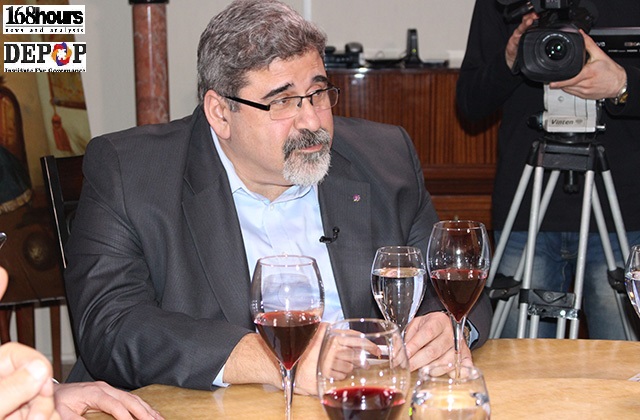
Azat Arshakyan: Yes, now we should discuss issues of productively using the time, what to do that our diplomacy made use of the victory of our soldier. Our soldier is more ahead, than diplomacy attempts to reach. It’s very dangerous, when we say let’s leave responsibility on Artsakh. We should become two against the one.
Artak Zakaryan: I agree with you, time works for us. Karabakh issue was the only one, which was a consensus, now it turns out that there are miscellaneous approaches around it. If I followed our debate from the side, I’d notice that we are speaking of quite different things. As for 800 hectares, it was an implication of the April War, however, from the perspective of strategic-tactical assessment, specialists prove that it didn’t have tactical after-effect. Now I don’t justify what has happened, however, at the same time, let’s be fair and look to what has happened.
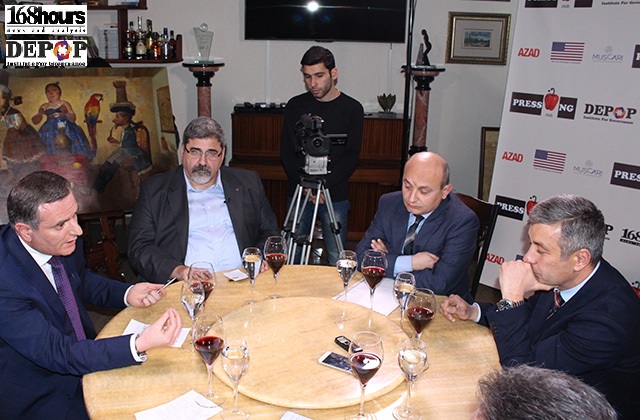
Regarding provision of security of posts nothing has changed. As for MFA achievements, of course, they exist, and I agree that military capabilities are more ahead, than diplomacy, however, it’s a continuous process and not always results are immediately observed. I’m sure, prior to elections of 2022 we’d speak of NKR issue, but I hope, we’d touch upon it with positive changes of the situation, those we imagine, as it changes rather quickly. We should find resources to oppose all the threats we currently have.
Giro Manoyan: I consider, discrepancy has always existed in NK issue, and in honor of powers present here that time there was consolidation during war. We shouldn’t think that there was no consensus. Let’s not forget that parallel to all shortcomings it was also Azerbaijan, which rushed to Moscow asking to interfere that the fights were suspended. We have lots of things to do without touching upon mandatory mutual concessions.
Vladimir Karapetyan: I don’t share Mr. Zakaryan’s opinion regarding loss of 800 hectares. It was pleasant for me listen to Mr. Manoyan’s position, which we were among the first to raise, standing next to people, the authorities on the April days. The conclusion is that I have concerns over moods available around NK conflict peaceful settlement. I was very concerned that Mr. Zakaryan said that in 2022 we should sit and discuss, I wonder, how much will our population decrease then? Our position is obvious: we should do our best to appear from the position of a peacekeeper, from strong positions, to lead the country to peace and not to war.
Ani Keshishyan
Razmik Martirosyan
Photos—“168 Hours”










